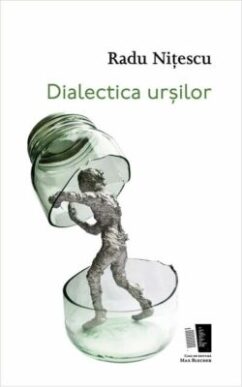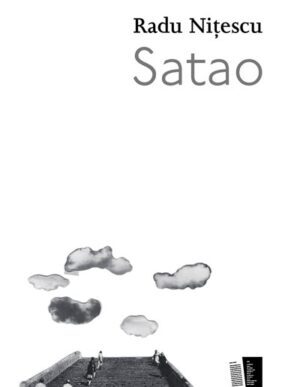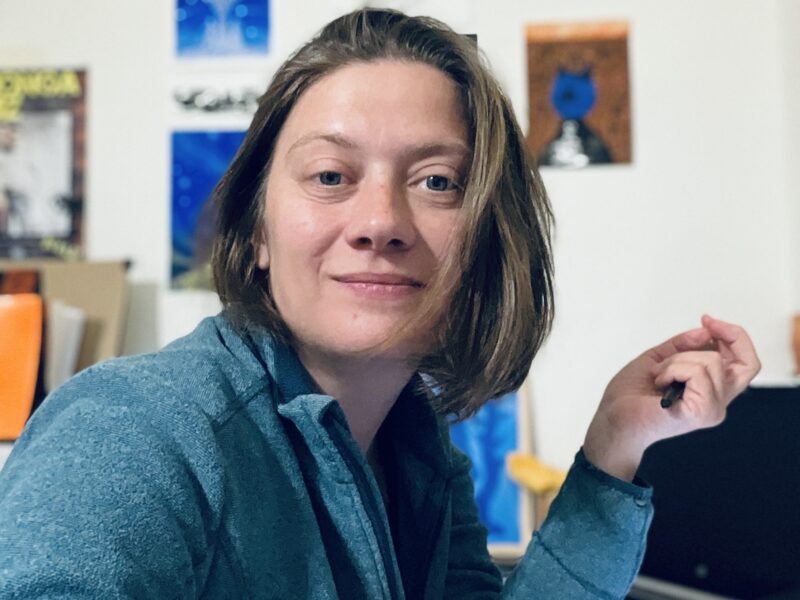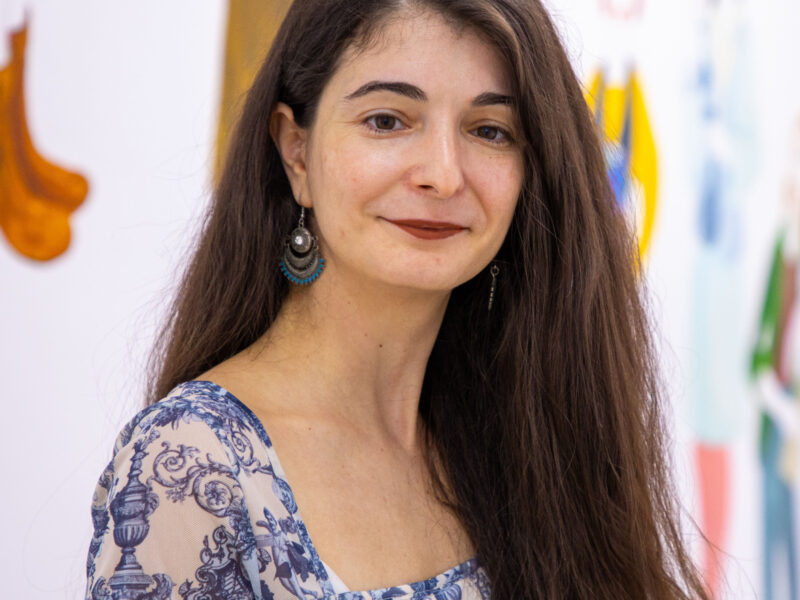The interview was made by Darius Brașov after winning the Special Prize of the panel of Modern and Contemporary Romanian Literature at BEST Letters Colloquia, 8th Edition (Faculty of Letters – University of Bucharest, 29-30 of October 2021)
Radu Nițescu (b. 1992, Bucharest) graduated the Faculty of Letters at the University of Bucharest. He published his first poetry book, gringo (Casa de Pariuri Literare), in 2012, which announced a young new wave poetry writer, heavily influenced by authors such as Bukowski or Ginsberg. Four years later, he published Dialectica urșilor (Bears’ Dialectic). He had poetry readings at numerous festivals, including Poets in Transylvania, Zona Nouă, Street Delivery Bucharest, Poezia e la Bistrița, FILIT, Sofia: Poetics. In 2020, he was declared Young Writer of the Year in Romania for his third poetry book, Satao (Max Blecher Publishing House).
Radu, ever since 2016 you’ve been a powerful voice in contemporary poetry. Beyond all the prizes you’ve been awarded, what would you say is the greatest satisfaction in regards to writing in a (sadly) minor literary environment?
I always thought it was a bit risky to use terms such as ‘minor’ or ‘major’ when talking about literature – or rather, when talking about a have type of literature or literary environment. But leaving that aside, I’d say the greatest satisfaction concerning writing is of two types: firstly, I met a ton of cool people, and a good part of my closest friends are linked to writing one way or another; secondly, writing has helped me cope multiple times; it proved to have a therapeutic effect in my case.
In her most recent book – Thanato Hotel (Max Blecher Publishing House, 2019) –, Livia Ștefan uses lines from Dialectica urșilor as a motto for her own book: ‘ce face un om/ lăsat singur în/ mintea/ lui’ [what does a man do/ when left alone/ in his own/ mind]. This is a remarkable example of intertextuality; how did you react to these two books communicating with each other?
We both published our debut books in 2012 at the same publishing house (Casa de Pariuri Literare) and four years later we would publish our second book ( Dialectica urșilor and Lolita32) at Max Blecher Publishing House. She was quicker than me with her third poetry book, Thanato Hotel, published in 2019. Regarding the lines in question, I can remember the exact moment I found out about her choosing them and how it filled my heart with joy, I must’ve been happy for days on end, at some point I couldn’t even remember what I was happy about. Livia’s poetry is super cool, you should read it!
Is there a ritual to your writing? Do you write daily or is there any propitious timing for writing?
Lately, pretty much since the end of summer, I’ve written close to nothing, I’ve only been sketching ideas in a notebook, some lines or stanzas here and there. A while ago there was no ritual, I would simply sit down next to my laptop whenever I felt like it and would write for an hour or two, then I’d go back to the text some other day, so on and so forth. Now I have a job and, needless to say, a rather heavy schedule, so I’ve been thinking about picking a day (Saturday, for example) to review the notes I’d take on weekdays. More structure, more planning. That’s probably the first step towards writing prose, which I’d like to start doing.
What does a day in your life look like?
It looks like the arc of a circle, or like a rainbow. It starts with the alarm (my phone like a cuckoo) and ends (as of late) with a Simpsonsepisode. What woke me up this morning around 5 or 6 a.m. was a Ro-Alert message regarding a fire in Popești-Leordeni. I couldn’t sleep anymore so I read some of the books I had bought the day before at the Poetry Fair hosted by Londohome this weekend. Right now, I was just about to leave for Institutul Blecher [Blecher Institute], where Adelina Pascale’s poetry debut ( maki for 2) is being released alongside the young Hungarian poets’ anthology translated by Mihók Tamás ( Către Saturn, înot [Towards Saturn, swimming]). Of course, today’s Sunday, a less busy day.
Dialectica urșilor is one of the poetry books that stand out in Iovănel’s Istoria Literaturii Române Contemporane [The History of Romanian Contemporary Literature (1990-2020)] . Is literary criticism still a thing? Should the answer be affirmative, what does literary criticism mean to you?
Surely we can talk about anything today. However, I am not the man to talk about literary criticism.
Apart from the fixed verse template used in Satao [a magical place/ unlike fairytales/ you’re granted three wishes/ it’s the real world/ illness unfurled/ half yours/ half universal/ and there the fish/ should you wish to fish/ will unveil the true wish], you’ve published villanelles on Mafia Sonetelor [Sonnet Mafia]. Would you say that a fixed template could account for a new poetic discourse? Or is this just a personal exercise of style?
As of late, people have been linking my name to this fixed formula, but I find this to be a bit of a stretch. There are poets (some part of my own generation, not to mention other literary areas) that can engage in fixed verses with much more enthusiasm and wit than I can. Needless to say, I’m certain poetry has no limits and is always open to change.
Multiple remarkable poets have proven capable to write both great poetry and great prose. The first that come to mind are Andrei Dósa and Vlad Drăgoi. Have you ever considered writing prose?
Just like I said before, I’d sure like to. It’s just a matter of finding enough time and coordination for it. I’ve not written so much prose thus far, and I didn’t even feel like publishing it. But I wish I could control all the prose elements required to write it (properly) and that I could find some time for that.
Name some elements belonging to your surroundings that you find truly poetic.
Well, for instance, it’s midnight right now, you have me writing this after returning from the Blecher edition I was previously telling you about, and something that stands out is this photo on my desk. It displays a four-year-old version of myself unpacking a Christmas gift, I can’t even recall what it was, but given the looks on my face, I kind of liked it, kind of not, I must’ve wished for something else. Apart from this picture, there’s the entire evening I spent at Londohome attending the two books’ release, Mihók’s reading from the Hungarian poets’ anthology and then Adelina’s reading from her own book, and the whole poetry that I got to listen to.
Flashback to ten years ago, you were just about to graduate from high school, is there any other path that you would’ve liked to follow?
No. No, I don’t think so.
If you could change just one aspect of the Romanian ‘literary world’, what would that be?
I’m not exactly familiar with everything that the Romanian ‘literary world’ could imply, though I must be following it extensively. I guess I’d like people to fight less and cooperate more. I don’t like to fight, don’t believe there’s anyone who does.
Who exactly is Radu Nițescu when he’s not a poet?
Same me, same old, I’d never be able to live numerous, parallel lives, although surely I’ll respect anybody that can pull it off.
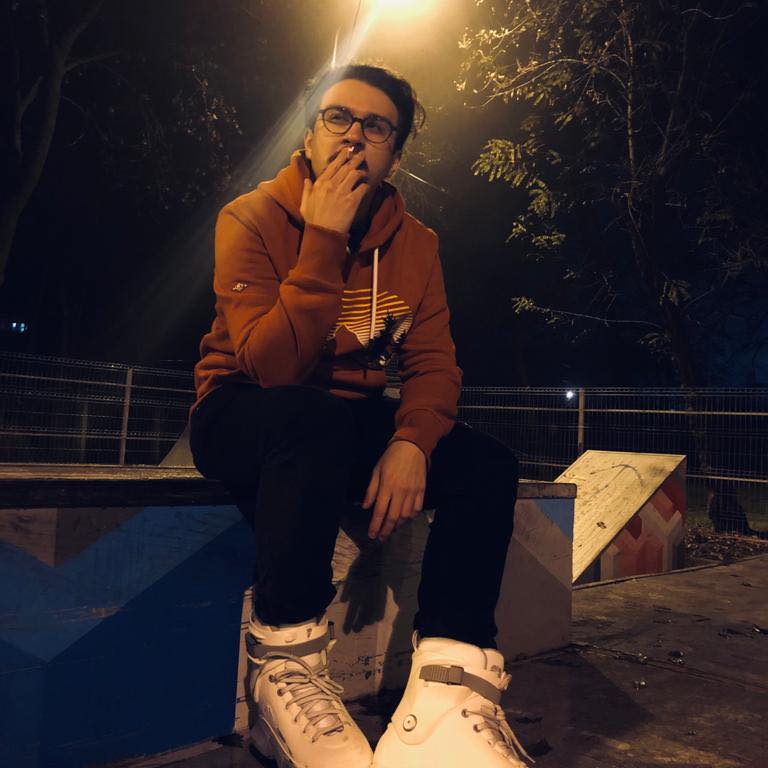
Darius Brașov (b. 2001, Iași) studies English & Comparative Lit at the Faculty of Letters in Iași. He published poetry on online platforms such as Noise Poetry and O mie de semne. He published poetry and book reviews in Timpul. His poetry readings include the Junimea XXI literary club and the Poetry Marathon hosted by Simona Popescu & The Faculty of Letters in Bucharest. He currently lives in Iași, where he hosts public poetry readings for his pets. He is also the lead guitarist and founding member of Țepeche Mode, a band only he has heard about. [Translated into English by Darius Brașov]


